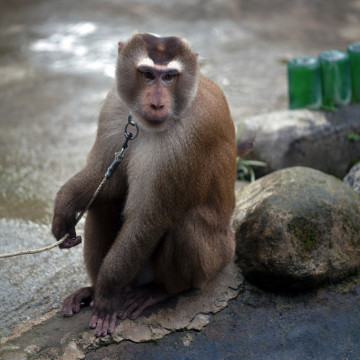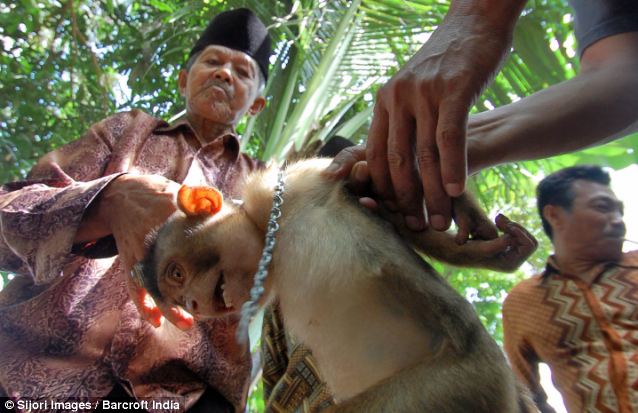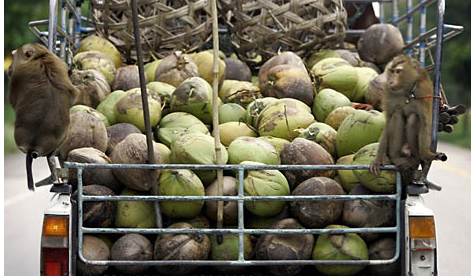 Surely you do your best to make the most ethical choices when shopping for products for your home. You ask: Were these products fairly traded? Were they produced under fair and ethical labor conditions? Were these products tested on animals? Does this product contain something like palm oil that is a leading cause of deforestation and a major contributor to the plight of the orangutan?
Surely you do your best to make the most ethical choices when shopping for products for your home. You ask: Were these products fairly traded? Were they produced under fair and ethical labor conditions? Were these products tested on animals? Does this product contain something like palm oil that is a leading cause of deforestation and a major contributor to the plight of the orangutan?
- A version of this article was originally published on A Peaceful Living.
So here’s some bad news, because I’ve got another disconcerting problem for you to consider: were the coconuts harvested for use in your coconut oil containing products picked by enslaved pig tailed macaques?
Yes. You read that correctly. And, sadly, no, I’m not joking.
I honestly thought I’ve heard it all throughout the years as I try to be more aware of how the products I use are made and where the products I consume come from. There is injustice linked to every part of our lives in the name of economic prosperity: factory workers who are forced to work unreasonably long hours in unsafe working conditions; factory farming; the stealing of dolphins and whales for use in the marine parks industry or also for meat…The list goes on…
The horrors we inflict on our fellow beings are appalling and I know that any sane person would reject this treatment as barbaric if only they stopped to consider it.
Which brings me to these monkeys.
I had no idea this was even a thing.
I’ve been to Southeast Asia and I’m well aware how both the animal tourism industry and the working animal industry are very much alive and central within their economies, especially in Thailand.
In fact, it was upon witnessing the underlying (and overt) horrors of the elephant tourism industry during my visit to Thailand that prompted my interest in animal rights.
I was so focused on learning about the exploitation of elephants that I didn’t think to visit one of the many “monkey training” schools where monkeys are trained from a very young age, as early as one month old, to harvest coconuts. As enterprising monkey trainers realized the amount of money to be made in tourism they opened their doors to tourists and have expanded to include circus-like shows where their monkeys perform tricks for an audience.
It’s no surprise that these places are lightheartedly marketed to tourists as a unique and entertaining experience for the whole family. And while tourists marvel at these monkeys as tiny curiosities, they snap photos using the monkeys as props, smiling broadly as a monkey shackled by the neck and chained to a pole sits idly by.
All I see when I look at these photos is willful ignorance in the face of pretty obvious cruelty.
“But it looks like the animals are well-cared for and enjoy what they’re doing,” one might say. But the sad reality is that these animals were stolen from the wild. While some are born into captivity on breeding farms, many were purchased from poachers who trap them in the forest and even stoop so low as to kill nursing mothers to steal the babies. After all, a monkey trained from a young age will be easier to handle and will become more skilled in his ability to yield the most coconuts.
Pig-tailed macaques can live up to 40 years–in shackles, laboring for long hours harvesting coconuts, or performing tricks. Training takes several months and physical punishment is typically used to force the monkeys into submission. Trained monkeys are resold to coconut farmers for a high price, making this aspect of the industry quite profitable for trainers.

A monkey being sold to coconut farmers.
The economic benefit to the coconut farmers who use these monkeys is obvious. According to some sources, these monkeys can harvest hundreds of coconuts per day, with estimates ranging widely from 300-1000.

Published earlier this month, the most comprehensive article I read, “Pay Coconuts, Get Monkeys“, gives an excellent picture of what life is like for these monkeys, how valuable they are economically, and how legal loopholes enable trainers and “zoos” to essentially get away with animal abuse.
Early on in the piece a man called Noi Petchpradab, who has been training macaques to harvest coconuts for thirty years, was interviewed and discusses daily life for these working monkeys:
When they are not working, the animals are chained to tree stumps, which Mr. Noi said is due to their aggressiveness. They are given three daily meals, consisting of rice mixed with Lactasoy milk.
The article also goes on to say:
Due to their ability to work for long hours, the macaques are capable of collecting 600-1,000 coconuts per day, compared to only 100-200 for humans. On a few occasions, he admitted, the monkeys are so tired they faint. (bold and italics added for emphasis)
This practice will surely continue as long as there is both a market for coconut oil and consumers who are ignorant to the fact that this is even happening. Also, there will always be an economic incentive for monkey trainers to open their schools to the public as long as tourists are willing to spend money to visit them.
What can you do to try and stop this practice?
– Firstly, don’t buy products that contain coconut oil from coconuts harvested by these monkeys. At the bottom of the article I’ve included a list of companies who I know use fairly traded coconut oil harvested by humans. The list is by no means exhaustive; just because a brand you use isn’t included does not mean they are supporting this industry. Simply reach out to a representative to the company to find out. I did just that for the coconut oil containing products I use in my home. Unfortunately, only one brand returned my inquiry (Alaffia), but I can now continue to buy their products knowing that I’m not contributing to the abuse of monkeys.
– Don’t visit these places. I connected with Ashley Fruno, Senior Campaign Manager from PETA Asia, and she says:
The most important thing that we can do to end this practice is to never patronize animal attractions and to educate others to do the same. Many coconut plantations offer tours, and some facilities double as circuses. The money spent at these facilities pays for this exploitive industry to continue.
– Spread the word! Ignorance is bliss, I suppose, but we can’t really affect positive change in the world if we don’t know there are problems that we may be unwittingly contributing to.
– Write letters to the governments who enable this type of abuse. In talking with Ashley Fruno, Senior Campaign Manager from PETA Asia, she says:
Animal protection laws in many countries in Asia are weak and often poorly enforced. Fighting industries like these is not usually possible from a legal standpoint because no laws are being broken.
So, one can only hope that making enough noise and expressing disdain for these practices could encourage some legal change within these countries.
BRANDS WHO CONFIRMED COCONUTS ARE PICKED BY FAIRLY COMPENSATED HUMAN WORKERS
- Allafia
- Biona
- Dr. Bronners
- Essential Trading Cooperative (UK)
- Harmless Harvest
- Mason Orphee
- Naked Coconuts
- Nutiva
I know this is tough news to accept and it can feel overwhelming, especially when there is already so much to contend with. Sometimes I feel truly helpless and wonder if I am even making a difference, but then I stop, take a step back, and realize that I am not perfect, but I can do my best to not turn a blind eye to this sort of thing.
Spread the word. And if you hear back from a brand who can confirm that their product is fairly traded and harvested by fairly-compensated human employees, please do let me know!
Related: Don’t Celebrate Ringling Bros. And Barnum and Bailey Elephant “Victory”
Get more like this–sign up for our newsletter for exclusive inspirational content!
__
Photo: Kousto via Flickr; Pay Coconuts, Get Monkeys, Bangkok Post; The Daily Mail; All American Vegan




